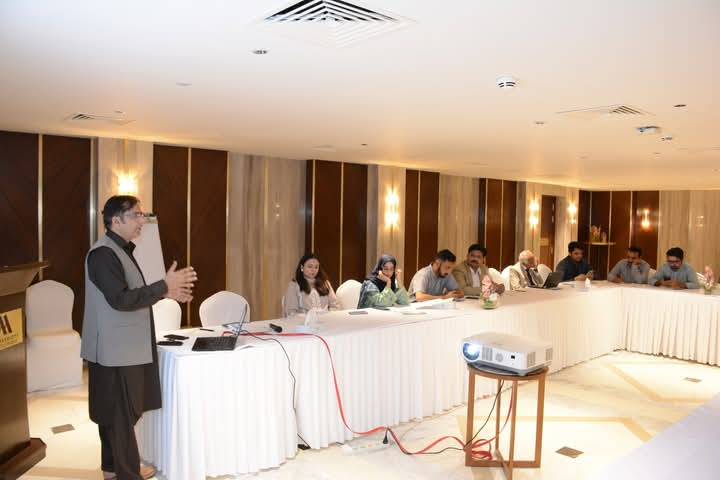
Environmental Journalists Raise Awareness on Pakistan’s Water Crisis at EJQM
Islamabad, Pakistan faces significant water governance challenges despite having enough water resources. Inefficient management, outdated irrigation practices, and lack of regulatory frameworks have contributed to water scarcity concerns, affecting agriculture, livelihoods, and climate resilience. Groundwater depletion, inadequate storage capacity, and inter-provincial water disputes further complicate the situation.
To highlight this growing issue and raise awareness, the International Water Management Institute (IWMI) brought together journalists at the Environmental Journalists Quarterly Meeting (EJQM) to engage them with experts for better understanding of water governance issues and promoting sustainable water management solutions. The meeting was organized under the Water Resource Accountability in Pakistan (WRAP) program, funded by the UK Foreign, Commonwealth & Development Office (FCDO).
Dr. Muhammad Ashraf, Country Representative, IWMI Pakistan, provided an overview of Pakistan’s water situation and governance challenges. He highlighted critical issues such as climate change impacts, water resources depletion, and the need for sustainable water management policies.
He emphasized the alarming state of Pakistan’s water storage, with the country retaining only 9% of its total water resources compared to the global average of 40%. He said, “the country’s heavy reliance on the monsoon season, which supplies 84% of its water, making storage important for mitigating flood risks and ensuring water availability throughout the year for agriculture, domestic, and ecosystem purposes. Only during the floods of 2010, 2011, 2014 and 2022 we lost around 140 million acre-feet (MAF) of floodwater besides having devastating impacts on human, livestock, crops and infrastructure”. Additionally, groundwater depletion was identified as a pressing issue, with water tables declining in almost all urban areas. For example, in Islamabad, it is declining at a rate of about 1 meter per year and in Quetta valley, the situation is even more severe where it is depleting at a rate of about 6 meters annually. He added.
Another key concern was the excessive use of water in growing crops, e.g. we are using more than 5,000 liters of water to produce 1 kg of rice, significantly above the global average of 1,000 liters. Outdated irrigation systems and the absence of crop zoning have contributed to inefficient water use, exacerbating resource scarcity. The session further discussed governance challenges, including the lack of regulations for groundwater use, implementation gaps in national water policies, and ongoing mistrust among the provinces regarding water distribution.

Dr. Jehanzeb Cheema, Deputy Country Representative, IWMI Pakistan and the Deputy Project Leader of WRAP program, provided a comprehensive overview of the project. He elaborated on how the Climate Resilient Solutions for Improving Water Governance (CRS-IWaG) component is strengthening water governance at the federal and provincial levels, particularly through the development of water accounting guidelines, early drought warning system, and productivity assessments and improvements.
Dr. Cheema provided key updates about the official handover of the Pakistan Drought Monitoring System (PakDMS) to the Pakistan Meteorological Department (PMD), the launch of the Groundwater Management Information System (GMIS) to improve groundwater monitoring, and the identification of 2,000–3,000 potential sites for small/mini dams and water storage ponds in Pothwar. He also highlighted IWMI’s efforts to support academic research through university consortiums in Punjab and KP and shared the success stories of soil moisture sensors, which have helped farmers reduce irrigation applications and improve water use efficiency.
Regular engagement with journalists is crucial for ensuring that critical environmental issues receive due attention. Meetings like EJQM bridge communication gaps among the researchers, policymakers, and the public, enabling healthy discussions and the dissemination of accurate information. Journalists play a vital role in shaping public perceptions and policy landscapes, making their informed reporting indispensable for driving meaningful change in water governance and climate resilience efforts.
Concluding the event, participants expressed their commitment to amplifying water governance issues and contributing to public awareness campaigns on climate resilience and sustainable water practices. This EJQM marked a significant step towards strengthening collaboration between environmental journalists and water sector experts, paving the way for informed reporting and enhanced public discourse on Pakistan’s water challenges and climate adaptation strategies.
#
For Media Queries:
Amjad Jamal,
Communications Specialist, IWMI Pakistan
Contact: +92 332 8500989
Email: amjad.jamal@cgiar.org
Website: www.iwmi.cgiar.org
About IWMI: The International Water Management Institute (IWMI) is research for development international organization that focuses on water and land resources for sustainable agriculture. IWMI’s mission is to improve water and land resource management for food, livelihoods, and nature. With its innovative solutions and extensive research, IWMI is committed to addressing the water challenges faced by communities worldwide.
